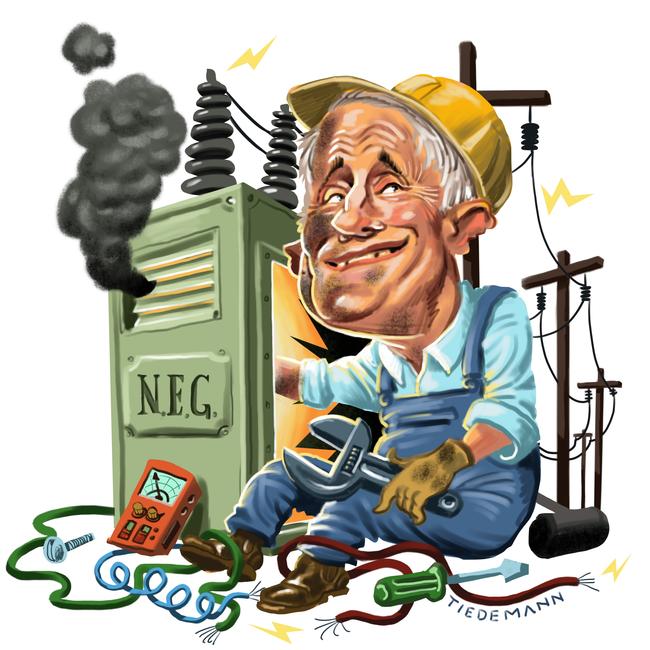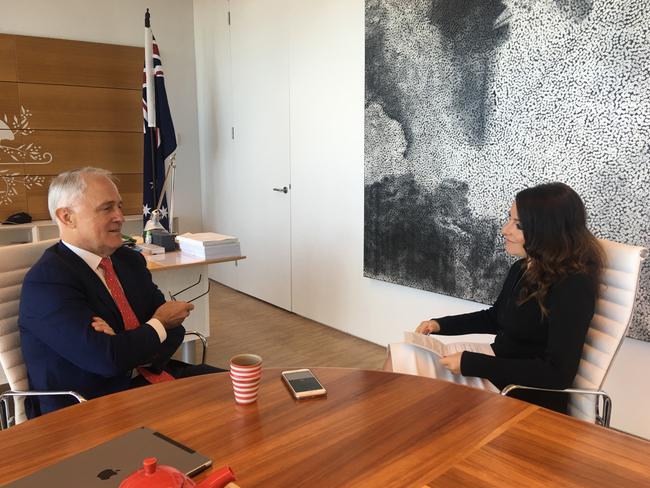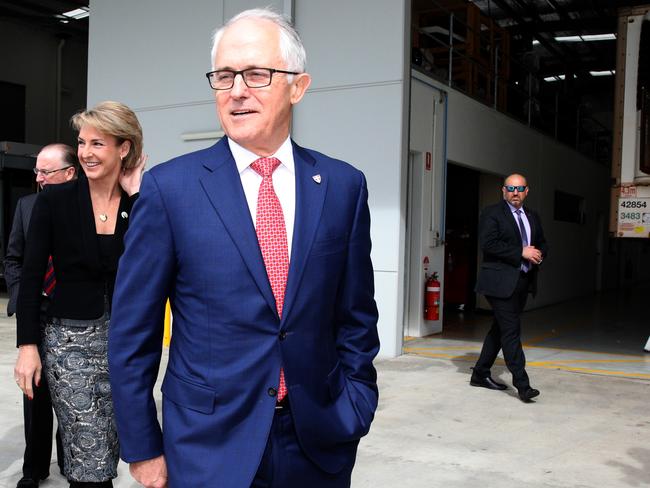Sharri Markson: Malcolm Turnbull’s shocking state of affairs
Passing the National Energy Guarantee will be a test of Malcolm Turnbull’s negotiating skills, and it’s hardly the only problem the PM faces as Parliament returns next week.
Opinion
Don't miss out on the headlines from Opinion. Followed categories will be added to My News.
WE’RE told the greatest need for Malcolm Turnbull’s signature energy policy, the National Energy Guarantee, is that it will slash our power bills by $550 a year.
Trouble is, days out from Tuesday’s Coalition party-room meeting, his own team is starting to believe this crucial promise is a big, fat lie.

And that has the potential to explode into a bigger political headache for the Prime Minister than the renewables-obsessed Labor state premiers who will decide today whether the NEG lives or dies.
Its fate will be determined by the ALP premiers of Victoria and Queensland, who want the policy to have even higher renewable energy targets, plus the capacity — in the legislation — to raise the targets in the future, and the blackout states of South Australia and NSW, who support the policy in the drive for “certainty” in the market.
For months Energy Minister Josh Frydenberg has told the public that certainty in the market created by the NEG will encourage new investment in the sector and that this — irrespective of whether that investment is in coal or renewables — will lower prices by hundreds of dollars a year.

But now senior figures in the Turnbull government are finally speaking up.
Their fundamental criticism is that the NEG will drive power prices up beyond our record highs, not slash them.
“The NEG is asking for a reduction in emissions which inevitably means emission-intensive fuel sources are discouraged,” one senior Liberal said.
These critics point to the fact that the same small network of energy modellers, who predict a $550 drop in prices, have previously got their forecasts dramatically wrong, for example in some of the modelling done for the 2014 Warburton review.
Scepticism over the forecasts is a point respected former Harvard economist Henry Ergas made this week.
SHARRI MARKSON: Turnbull isn’t embarrassed by his fortune
And it’s why some Liberals want a price target instead of an emissions target, with one lamenting that “the public is screaming at us about electricity prices, as are businesses”.
Frydenberg is going to try to push the NEG through COAG and Tuesday’s party room, where he faces real pockets of hostility.
As he prepares to go into battle with his energy policy, he was yesterday reciting the old Churchill line: “Now this is not the end. It is not even the beginning of the end. But it is, perhaps, the end of the beginning.”
Turnbull, the negotiator, is likely to waltz into the party room on Tuesday morning pledging a government guarantee for private investment in dispatchable baseload power.
This commitment to reducing risk in investing in coal is the sweetener that could win the support of some conservatives, even if they remain deeply sceptical that prices will ever fall under his plan.

But party-room support is not essential for the NEG to operate, while the backing of Labor premiers is absolutely crucial because energy laws are state-based. Only one element of the NEG requires federal legislation, which is the national emissions target.
On this front, Tony Abbott is likely to cross the floor, with some colleagues following him, arguing we should, like Donald Trump, abandon our commitment to the Paris agreement.
These potential fireworks come as Turnbull and Frydenberg are under siege for their $444 million grant to the understaffed Great Barrier Reef Foundation, which has just six employees. It has been dubbed a “captain’s call”.
Labor and talkback callers alike have been in an uproar that there was no competitive tender process for the half-billion-dollar grant, which foundation managing director Anna Marsden has described as akin to winning the Lotto.
MORE OPINION:
Having a ‘fur-baby’ doesn’t make you a parent
Mental health care shouldn’t be a luxury
Vultures feeding on drought disaster
These are some of the hot potatoes plaguing Turnbull possibly just seven months out from a federal election.
The most likely federal election date is May 25, 2019, but the PM is also understood to be considering going to the polls on March 2 — before the March 23 NSW election.
Gladys Berejiklian would rather the Feds go first next year to give her clear air for a state campaign, which isn’t overshadowed by the more exhilarating federal issues. (In truth, her preference would likely be for Turnbull to go to the polls this year, but that ain’t happening.)
Plus, whoever goes first will get the first bite at NSW Liberal fundraising dollars, which are threadbare and will likely require another top-up from Turnbull.
In all reality, it doesn’t seem like the Turnbull government is ready for an election anytime soon.

The debacle in Lindsay has been long-running and yet the Liberal Party still does not have a rolled-gold candidate ready to run for the seat Husar this week announced she would not recontest. It’s breathtaking ineptness.
Worse, though, than the party’s lack of organisation, the current crop of government frontbenchers do not seem to know how to mount a lethal attack against Shorten. There is no killer instinct.
Yes, Turnbull was hard on Labor in an interview I did with him this week in which he said it was not believable that Shorten, a man who is meant to be a righteous advocate of workers’ rights, didn’t know about the allegations in Husar’s office.
But, can you imagine if it was embattled Liberal Minister Michaelia Cash, not Emma Husar, at the centre of this staffing scandal?
Cash would be crucified with Shorten and his attack dogs, such as Tony Burke, turning the political pressure so high that she would have had to leave politics immediately with a by-election already called.
This is even more crucial in the marginal seat of Lindsay in the heart of Sydney’s west, where Labor has shown contempt for voters by continuing to support an MP for a year after serious allegations against her first surfaced.
And this is the reality of politics as federal Parliament returns Monday.
Shorten is getting away without serious scrutiny about whether he has told the truth about when he found out about the Husar scandal — and all because of a weakness at politics at the very heart of the Turnbull government.
